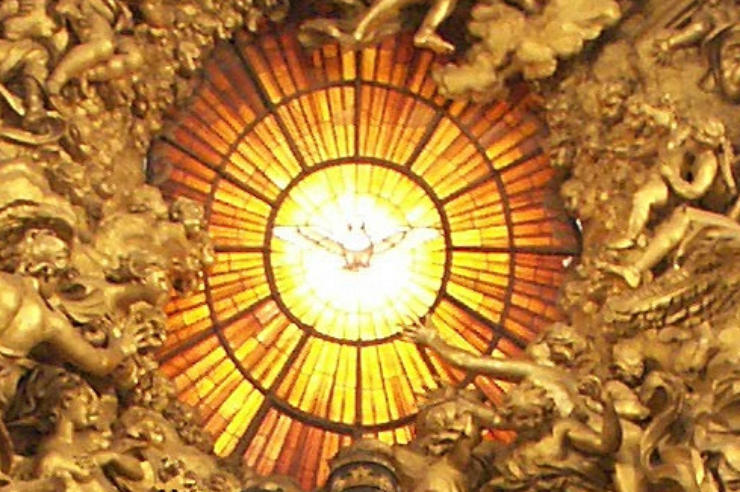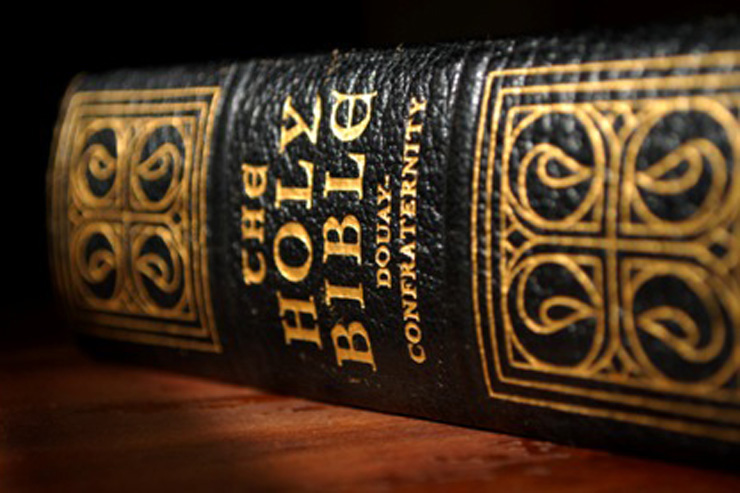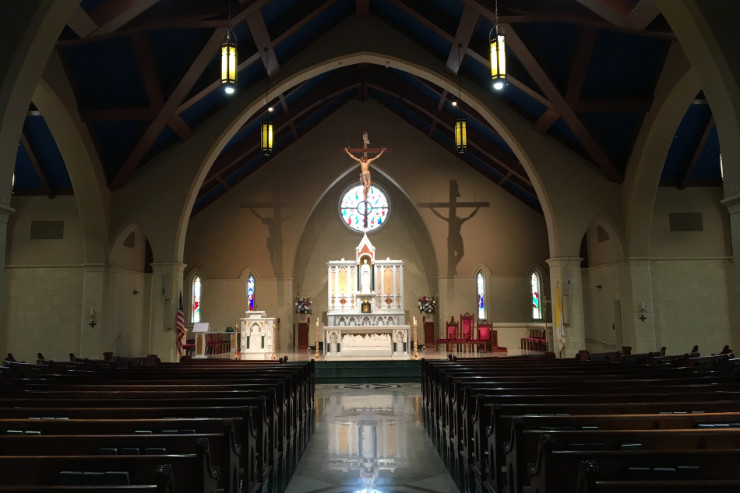
Detail of Chair of St. Peter Dnalor 01, Rom, Vatikan, Petersdom, Cathedra Petri (Bernini) 4, Detail, CC BY-SA 3.0
Hilary of Poitiers, fourth century champion of the Trinity, here explains the Holy Ghost as gift and Spirit of truth, “the light of our minds and the splendor that irradiates our understanding.”
Our Lord commanded us to baptize in the name of the Father and of the Son and of the Holy Spirit. In baptism, then, we profess faith in the Creator, in the only-begotten Son and in the gift which is the Spirit.
FATHER, SON & HOLY SPIRIT
There is one Creator of all things, for in God there is one Father from whom all things have their being. And there is one only-begotten Son, our Lord Jesus Christ, through whom all things exist. And there is one Spirit, the gift who is in all. So all follow their due order, according to the proper operation of each: one power, which brings all things into being, one Son, through whom all things come to be, and one gift of perfect hope. Nothing is wanting to this flawless union: in Father, Son and Holy Spirit, there is infinity of endless being, perfect reflection of the divine image, and mutual enjoyment of the gift.
SPIRIT OF TRUTH
Our Lord has described the purpose of the Spirit’s presence in us. Let us listen to his words: I have yet many things to say to you, but you cannot bear them now. It is to your advantage that I go away; if I go, I will send you the Advocate. And also: I will ask the Father and he will give you another Counselor to be with you forever, the Spirit of truth. He will guide you into all the truth; for he will not speak on his own authority, but whatever he hears he will speak, and he will declare to you the things that are to come. He will glorify me, for he will take what is mine.
GUIDE TO UNDERSTANDING
From among many of our Lord’s sayings, these have been chosen to guide our understanding, for they reveal to us the intention of the giver, the nature of the gift and the condition for its reception. Since our weak minds cannot comprehend the Father or the Son, we have been given the Holy Spirit as our intermediary and advocate, to shed light on that hard doctrine of our faith, the incarnation of God.
LIGHT OF OUR MIND
We receive the Spirit of truth so that we can know the things of God. In order to grasp this, consider how useless the faculties of the human body would become if they were denied their exercise. Our eyes cannot fulfill their task without light, either natural or artificial; our ears cannot react without sound vibrations, and in the absence of any odor our nostrils are ignorant of their function. Not that these senses would lose their own nature if they were not used; rather, they demand objects of experience in order to function. It is the same with the human soul. Unless it absorbs the gift of the Spirit through faith, the mind has the ability to know God but lacks the light necessary for that knowledge.
UNIQUE GIFT OF GOD
This unique gift which is in Christ is offered in its fullness to everyone. It is everywhere available, but it is given to each man in proportion to his readiness to receive it. Its presence is the fuller, the greater a man’s desire to be worthy of it. This gift will remain with us until the end of the world, and will be our comfort in the time of waiting. By the favors it bestows, it is the pledge of our hope for the future, the light of our minds, and the splendor that irradiates our understanding.
The above post is on the Holy Ghost as the gift, the Spirit of Truth and the light who leads us to authentic knowledge and understanding of the things of God. It is an excerpt from Saint Hilary of Poitiers’ treatise On the Trinity (Lib. 2, 1, 33.35: PL 10, 50-51, 73-75). It is used in the Roman office of readings for Friday of the 7th week of Easter in preparation for the Feast of Pentecost.
St. Hilary of Poitiers
Hilary, born in the early fourth century and elected bishop of Potiers, France around the year AD 353, became the leading and most respected Latin theologian of his age. Seeking to immunize the church against the infection of the Arian heresy, which denied the divinity of Christ, he wrote an extensive treatise On the Trinity which is perhaps his most famous work. For his trouble, he was exiled by the Emperor, an Arian sympathizer. St. Hilary, one of the Fathers of the Church, died in 367 and was proclaimed a Doctor of the Church fifteen centuries later by Pope Pius IX. Biography by Dr. Italy














